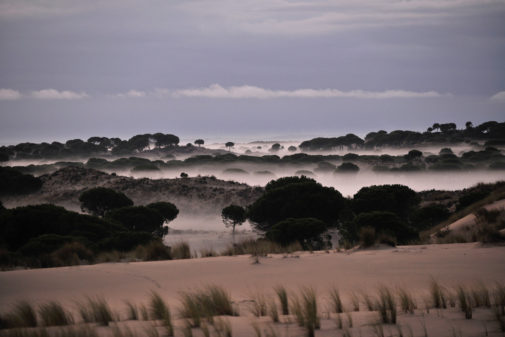- 50 years of Doñana (I) .The park of a thousand controversies
- Agriculture: Most of the illegal wells of Mount Huelva in the Doñana area are sealed
In the mid-50s, the Chevrol Oil company sought oil within Doñana . In 1974, the Government announced a nuclear power plant between Matalascañas and Mazagón. Other times, but in the surroundings of the first protected area in Andalusia, tensions continue in 2019 due to the use of that territory and its resources. On its 50th anniversary, Doñana continues to shout about development and conservation. The conflict with the farmers is part of a range: dredging, fishing, mine, gas warehouse, drone airport, hotels ...
The great crisis, climate change , is in the background in Doñana due to the succession of specific conflicts. The incidents that occur with Huelva farmers to open illegal wells are part of the Doñana landscape. The clashes have already occurred with Almonte farmers in the 90's. And there are skirmishes with anguleros and, it is to be feared, coquineros.
Francisco Bella , mayor for 20 years of Almonte and now leader of the opposition, defends his countrymen: "Agriculture has developed here as in other areas, in Spain we are not accustomed to doing things differently; in the end it is criminalized to people that all they do is generate wealth. "
"Doñana does not have to be a problem; we make things difficult, when something is illegal, it is illegal," says Lola Escalona , mayor of Aznalcáza r between 2007 and 2015, although she admits that "the farmer is not to blame, there are many people who come "from that activity. She is a farmer and tells a paradox. When British Mark and Spencers' commercials evaluated their potatoes, and finally bought them, they asked me to label the bags with the phrase 'produced in the Doñana environment'. They were clear.
Doñana survives the controversial initiatives to trancas and canyons. The case of the gas warehouse seems lost. The European Parliament itself has backed the three projects to be reassessed environmentally, now as one. Even the Government promised parliamentarians to visit the area that they would withdraw the qualification of strategic.
In dredging , the last assault is also victorious for the park. "That seems resolved," says Alberto Ruiz Larramendi , former director of Doñana. "The Supreme Court has made it very clear that the 99 project cannot be done," says Juanjo Carmona , 20 years linked to Doñana from WWF. "If the Port wants to go to a different phase, it must sign a waiver of that project, a zero marker", and fix the problems with the measures that the scientists proposed in 2010, "which have not been applied."
The Aznalcóllar mine
The Aznalcóllar mine does return. "It is still a sword of Damocles, the subject should be completely closed," believes Larramendi, who dealt with the "nightmare I do not want even my worst enemy" of the spill of Boliden Apirsa . The reopening is closer after the court rejected the appeal of the non-winning company. Carmona believes that it will be years because "the route of the administrative litigation can begin, until now he was going through criminal matters"
The requalification of 75 hectares of forest land in the natural space to raise the CEUS project is another of the new controversies, in this case already millennial, as it is a validation base for drones. There would be workshops, fuel tank and takeoff track of 2 kms.
Only the old cattle conflict seems rested. 1,700 heads of mares and cows breed Marismeña graze in the park. "Today it is not disputed that well-controlled cattle carry out environmental management," says the secretary of the livestock association, Sergio Nogales .
Another latent dilemma is that of the northern Doñana highway , Cádiz-Huelva. Although the PP always asked to build it, now in the Government or mention it. Francisco Bella will return, if he becomes mayor again, with his old idea: a public transport along the beach to Sanlúcar. "The park gives permission to travel by car to the beach to everyone who asks for it, that is a fair; so I propose that no one go privately and be done publicly."
With the coquina waiting for their own conflict, since non-Doñaneros shellfish makers demand that they be allowed to enter those beaches, the economic sector that does head up is that of ecotourism. "In the 80 we were serving with land rovers; now there are times when the quota of 8 minibuses is completed," explains Gonzalo Dorado , manager of the cooperative that makes the visit to the national park.
Beltrán Ceballos , creator of the Doñana International Bird Fair, which he organizes in La Puebla del Río (Seville), highlights the professionalization of the sector in a few years. "Against wind and tide," he says, "because in Doñana the Administrations do not allow ecotourism." He points to the municipalities: "Only Aznalcázar carries it by flag; Almonte does things counterproductively, and Sanlúcar fails to internalize the Doñana business at all."
The former director of the park Alberto Larramendi warns that "in Doñana visitors suffer a lot of limitations, while other groups, the main one the rociero , seem to have a carte blanche to move ". He describes it as "profound contradiction" that "if you are a rociero you can go through Doñana several times a year, and if you are a visitor, your chances of going on foot are zero." And a brother of the brotherhood says it.
According to the criteria of The Trust Project
Know more- PP
- European Parliament
- Seville
- Supreme Court
- Andalusia
- Cádiz
- Spain
- Huelva
- Environment
Illegal fishing Illegal fishermen board a tugboat of Captaincy and release four 'paperless' ships
Crimes that changed Spain (II) Mari Luz Cortés, the cry that became multitude and rewrote the Criminal Code
Tourism Almost 9 million tourists visited Andalusia in the second quarter of 2019

